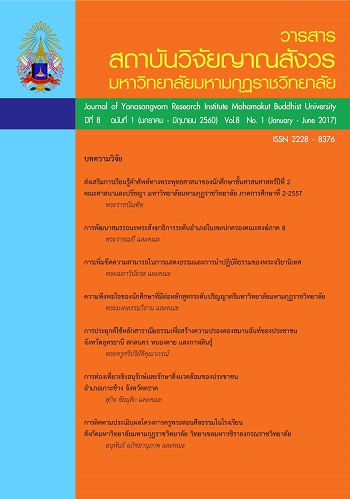Competency Development of District Administrative Monks in Sanghã Administrative Region 8
Main Article Content
Abstract
The objectives of this research were: 1) to study the performance competency of district administrative monks in the Sanghã Administrative Region 8, 2) to improve the performance competency of district administrative monks in the Sanghã Administrative Region 8, and 3) to propose ways to improve the performance competency of district administrative monks in the Sanghã Administrative Region 8. The mixed research methodology was used in the study. The qualitative research method was used in data collecting from documents, interview with 12 key-informants and focus group discussion with 6 key-informants. The data were analyzed by content analysis. The quantitative research method was used in collecting the data from 75 district administrative monks through questionnaires. The data were analyzed by mean and standard deviation. The results of the study found that: 1. The performance competency of district administrative monks in the Sanghã Administrative Region 8 was in the satisfying level. There were some aspects that should be improved as follows: 1) In administration; some of the district administrative monks lacked of knowledge in Sanghã administration system and the administration based on modern science, 2) In propagation, some of them propagated in the passive performance and lacked of knowledge and skills in propagation through media, and 3) In public assistance, some of them lacked of knowledge in temple infrastructure planning, temple administration plan setting, renovation of temple buildings, architecture, ancient objects, and temple property and assess management. 2. There were six element components in improving the performance competency of district administrative monks in the Sanghã Administrative Region 8; 1. Principle, 2. Target, 3. Objective, 4. Preparation, 5. Process, and 6. Evaluation. The development progress in the training of the performance competency of district administrative monks had six areas: 1) administration, 2) religious study, 3) educational welfare, 4) propagation, 5) public welfare, and 6) public assistance. All the six areas of competency development consisted of knowledge in competency and development including study, lectures, workshops, group discussions, brainstorming and field-trip study. 3. Overall, the performance competency of district administrative monks in the Sangha Administrative Region 8 was at a high level. In details, the component 1, 2, 3 and 5 was at the highest appropriate level, and component 4 and 6 was at a high appropriate level.
Article Details
References
คณาจารย์มหาวิทยาลัยมหาจุฬาลงกรณราชวิทยาลัย. การปกครองคณะสงฆ์ไทย. พิมพ์ครั้งที่ 3. กรุงเทพมหานคร : มหาจุฬาลงกรณราชวิทยาลัย, 2553.
บุญชม ศรีสะอาด. การวิจัยเบื้องต้น. พิมพ์ครั้งที่ 5. กรุงเทพมหานคร: ชมรมเด็ก, 2545.
พระครูกิตติญาณวิสิฐ (ธนา กิตฺติาโณ). “สมรรถนะของผู้บริหารสำนักศาสนศึกษาพระปริยัติธรรม แผนกธรรม ตามหลักพุทธธรรม”. วิทยานิพนธ์ปริญญาพุทธศาสตรดุษฎีบัณฑิต (พุทธบริหารการศึกษา). บัณฑิตวิทยาลัย : มหาวิทยาลัยมหาจุฬาลงกรณราชวิทยาลัย, 2557
.
พระครูปริยัติกิตติธำรง (ทองขาว กิตฺติธโร). “บทบาทพระสงฆ์กับการพัฒนาสังคมยุคปัจจุบัน”. รายงานการวิจัย. สถาบันวิจัยพุทธศาสตร์: มหาวิทยาลัยมหาจุฬาลงกรณราชวิทยาลัย, 2551.
พระเทพปริยัติสุธี (วรวิทย์ คงฺคปญฺโญ). เอกสารประกอบคำบรรยาย เรื่องการปกครองคณะสงฆ์และการพระศาสนา. กรุงเทพมหานคร : มหาจุฬาลงกรณราชวิทยาลัย, 2540.
พระธรรมปิฎก (ป. อ. ปยุตฺโต). ทางสายอิสรภาพของการศึกษา. พิมพ์ครั้งที่ 2. กรุงเทพมหานคร : สหธรรมิก, 2541.
พระมหาธฤติ วิโรจโน (รุ่งชัยวิทูร). “รูปแบบการพัฒนาพระสังฆาธิการเพื่อประสิทธิภาพการบริหารกิจการคณะสงฆ์”. วิทยานิพนธ์ปริญญาพุทธศาสตรดุษฎีบัณฑิต (รัฐประศาสนศาสตร์). บัณฑิตวิทยาลัย : มหาวิทยาลัยมหาจุฬาลงกรณราชวิทยาลัย, 2556.
พระมหาธฤติ วิโรจโน (รุ่งชัยวิทูร). “รูปแบบการพัฒนาพระสังฆาธิการเพื่อประสิทธิภาพการบริหารกิจการคณะสงฆ์”. วิทยานิพนธ์ปริญญาพุทธศาสตรดุษฎีบัณฑิต (รัฐประศาสนศาสตร์). บัณฑิตวิทยาลัย : มหาวิทยาลัยมหาจุฬาลงกรณราชวิทยาลัย, 2556.
พระมหาศรณชัย มหาปุญฺโ (การะเวก). “การพัฒนาการบริหารกิจการคณะสงฆ์ของพระสังฆาธิการในยุคโลกาภิวัตน์”. วิทยานิพนธ์ปริญญาพุทธศาสตรดุษฎีบัณฑิต (รัฐประศาสนศาสตร์). บัณฑิตวิทยาลัย : มหาวิทยาลัยมหาจุฬาลงกรณราชวิทยาลัย, 2556.
พระมหาสมทรง สิรินฺธโร และคณะ. บทบาทของวัดและพระสงฆ์ไทยในอนาคต. กรุงเทพมหานคร : เคล็ดไทย, 2525.
มหาจุฬาลงกรณราชวิทยาลัย. พระไตรปิฎกภาษาไทย ฉบับมหาจุฬาลงกรณราชวิทยาลัย, กรุงเทพมหานคร: โรงพิมพ์มหาจุฬาลงกรณราชวิทยาลัย, 2539.
สมเด็จพระมหารัชมังคลาจารย์ (ช่วง วรปุญฺโญ), คู่มือพระสังฆาธิการว่าด้วยเรื่องการคณะสงฆ์และการศาสนา, กรุงเทพมหานคร: โรงพิมพ์การศาสนา, 2540.
เสาวนีย์ ไชยกุล และนางจงจิตร แสงทอง. “บทบาทพระสังฆาธิการที่มีต่อการพัฒนาศาสนศึกษาและการศึกษาสงเคราะห์จังหวัดพะเยา”. รายงานการวิจัย. บัณฑิตวิทยาลัย: มหาวิทยาลัยมหาจุฬาลงกรณราชวิทยาลัย, 2554.
อนันต์ นามทองต้น. “การพัฒนาตัวบ่งชี้สมรรถนะการบริหารจัดการเรียนรู้ของผู้บริหารสถานศึกษาขั้นพื้นฐาน”. วิทยานิพนธ์ปริญญาการศึกษาดุษฎีบัณฑิต, สาขาวิชาการบริหารการศึกษา. บัณฑิตวิทยาลัย : มหาวิทยาลัยนเรศวร, 2553.
Cronbach, Lee J. Essentials of psychological testing. 4th ed. New York : Harper & Row, 1971.
Hearn Close Smith Southey. Defining generic competencies in Australia : Towards a framework for professional development, Asia Pacific Journal of Human Resources, 34(3), 1996, pp. 44-62.
Likert, Rensis, “The Method of Constructing and Attitude Scale”, in Reading in Attitude Theory and Measurement. Fisheye, Matlin, Ed, New York : Wiley & Son, 1967 : 90-95.


